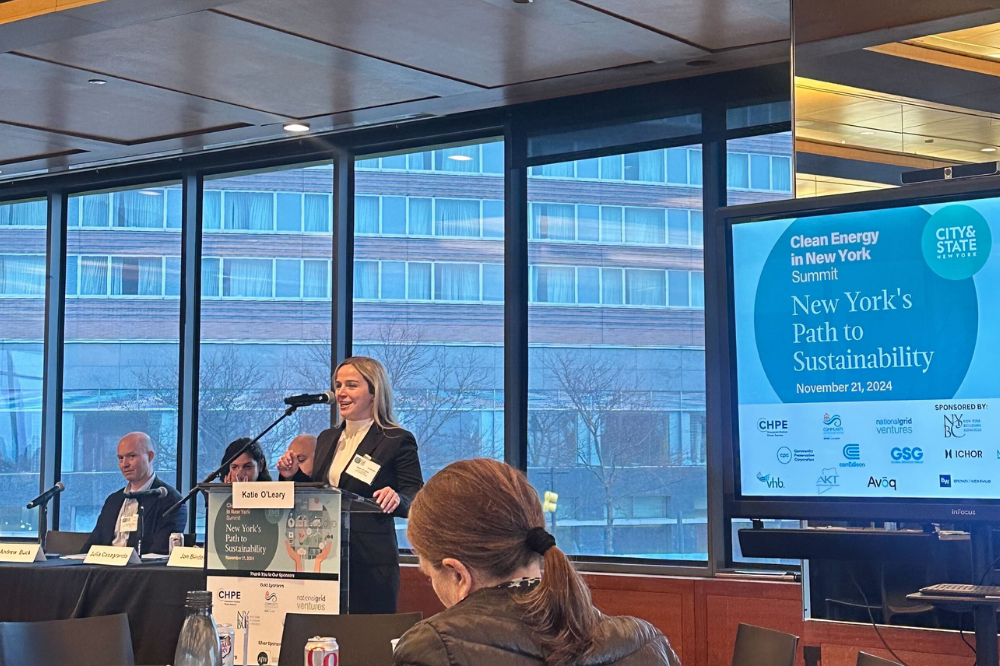ASC's Intersections Newsletter — November 22nd, 2024
Nora’s Note
Mobilizing for New York's clean energy future. ASC’s Climate Strategy team joined City & State’s Clean Energy in NY Summit this week for an in-depth look at New York’s clean energy goals and the steps ahead to make decarbonization a reality. Keynotes from Doreen Harris, President & CEO of NYSERDA, and Kathleen Schmid, deputy executive director at the Mayor’s Office of Climate and Environmental Justice, reaffirmed New York’s nation-leading commitment to achieving net zero emissions by 2040 and identified the steps needed to achieve this goal, including an essential focus on training and empowering the clean energy workforce. Last year alone, jobs in clean energy grew at more than twice the rate of the overall U.S. labor market. Inclusion of disadvantaged communities, who often face some of the greatest effects of climate change, will be critical to facilitating a just transition to renewables. ASC is proud to continue our commitment to a clean energy future in New York state and beyond as we work to support economic empowerment and innovation across industries.
Transportation
DOT celebrates a decade of safety improvements on queens blvd. With NYCDOT’s completion of the final phase of the Queens Boulevard’s redesign, the formerly infamous “Boulevard of Death” is now a model for Complete Streets, the approach to street design and operation that prioritizes safe access all those on public transit. Since NYCDOT introduced bike lanes nine years ago, traffic fatalities are down 68 percent and pedestrian injuries are also down 35 percent. Read more on the improvements NYCDOT has brought forward. (Source: Streetsblog)
New York Post: Hochul announces $9 NYC congestion pricing to begin in January
Mass Transit Mag: Federal Transportation Department set to kick in $72 million toward Penn Station renovations
Smart Cities Dive: MBTA improves Boston-area transit service but faces looming budget crunch
Climate
Biden EPA to charge first-ever ‘methane fee’ for emissions waste by oil and gas companies. A new rule under the Biden EPA will charge oil and gas companies a fine for emitting climate-warming methane, the primary component of natural gas, above an approved threshold. The fee would finance early deployments of technology to reduce methane and other greenhouse gas emissions, and upgrades are expected to reap up to $2 billion in climate benefits. Read more on the incoming administration expected to slash the methane fee, along with many other oil industry regulations. (Source: Associated Press)
Utility Dive: Demand response programs can help boost reliability, cut emissions in New York, advocates say
New York Post: Plastic-eating worm discovered — could help reduce pollution ‘faster and more efficiently’, scientists say
The Cool Down: Researchers confirm new battery design that could change the way we think about EVs
Economic Development
With a $2.5M direct cash assistance pilot, Ohio city aims to boost low-income residents’ economic mobility. Columbus, Ohio plans to support 200 working households earning above the federal poverty line but below the regional cost of living. Participants will receive $500 monthly for two years while completing job training or financial programs. This initiative aims to boost economic mobility, inspired by successful guaranteed income experiments nationwide. Read more about this city’s direct cash assistance program boosting economic mobility and financial stability. (Source: Smart Cities Dive)
Route Fifty: VA proposes funding telehealth access points at non-VA facilities
NBC: NYC Council passes bill to end broker fees for tenants in veto-proof vote
Governing: A County’s Comprehensive Approach to Training Latinos in Tech
Digital
Google, NLC issue AI guide for city leaders. The National League of Cities (NLC) and Google released a guide to help local governments integrate AI technologies while addressing associated risks. The report highlights applications like traffic optimization, service chatbots, and infrastructure maintenance and warns about potential privacy, security, and bias issues. It emphasizes overcoming barriers such as resource limitations and the emerging "AI divide" among municipalities. Read more on AI use in cities including Memphis’s pothole detection and Tucson’s predictive water pipe maintenance. (Source: Smart Cities Dive)
Transport Topics: Homeland Security Department Releases AI Framework
Route Fifty: Communities to get tech, data help to tame extreme heat
GovTech: Upstate New York Community Approves AI Data Center Plan
About Arch Street Communications
At ASC, we help government agencies, corporations and nonprofit organizations across the globe communicate issues that affect people’s lives. We’re the bold, nimble, women-owned small business (WBE) that has supported strategic communications programs to build stronger communities for 30 years.
Ready to find the “simple truth” solutions to build a better future? We want to hear from you! Get in touch to learn how our signature approach can work for you.
Subscribe to Arch Street Communications' Newsletter Intersections

